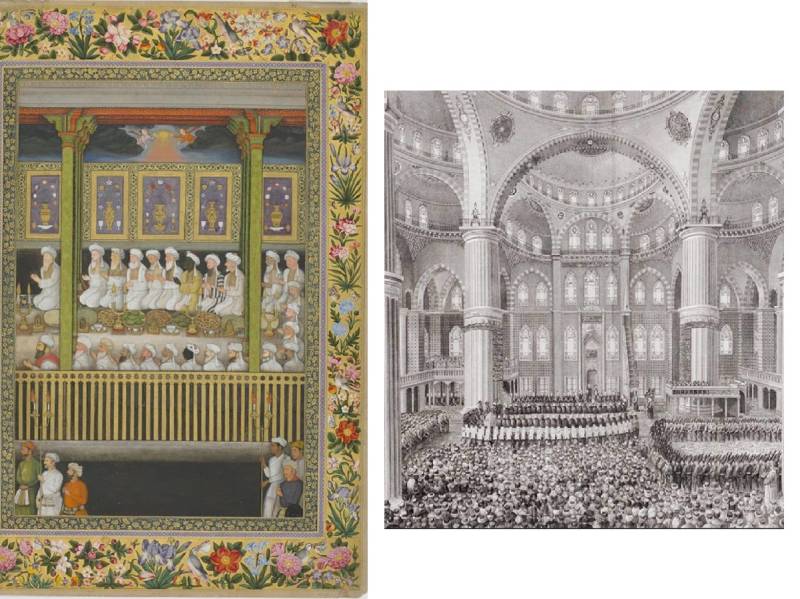
On one of those mornings in the Islamic month of Rabi ul Awal, when one already feels deeply connected to the divine Ishq (love), the recitation of this Naãt-e-Rasool (SAW) in a sonorous and melodious voice brings serenity and hope to lovers.
The history of Mawlid (or Milad, the birth anniversary of Prophet Muhammad PBUH) dates back to the times of the Sahaba and the Tabi‘un. Some of the Tabi’un began holding sessions in which they composed poetry and Naãt (poems expressing love for Muhammad PBUH) to honour him. Verses in praise of Muhammad PBUH were recited in Madinah during the migration, and Muhammad PBUH did not prohibit poets or poetry.
The early celebrations included elements of what came to be described as Sufism, with animal sacrifices and torchlight processions, along with public sermons and a feast. The earliest traces of these celebrations can be traced back to Egypt, where Milad initially started as a private affair and later became a public event. It has become a public holiday in many countries to commemorate Milad with deep reverence. Eid Milad-un-Nabi (PBUH) occurred during the day, in contrast to modern observances, with rulers playing a key role in the ceremonies. Emphasis was placed on the Ahl-al-Bayt, with sermons and Qur'an recitations.
Shab-e-Qadr, Shab e Barãt, processions in the month of Muharram-ul-Haram, Eid, and Jashn-e-Eid Milad un Nabi were celebrated with great enthusiasm and religious fervour. Each occasion had its own cherished practices, and there was not a single day in Rabi-ul-Awwal without commemorating the birth of the last Prophet (PBUH).
Our school used to host a grand Milad, akin to a coronation event, with scholars, Qaris, Naãt-khwan, celebrities, writers, thinkers, waaiz, listeners and devotees. We practiced recitations of Naãtia Kalam (poetry praising the Prophet PBUH), composed Hamds (compositions praising Allah), and debated topics like the Qur'an and science, the status of women in Islam, and the virtues of cultivating love for righteousness and charity. Chief guests were carefully chosen, always thinkers and scholars from the fields of science and humanity, rather than politicians. The choice of uniform colours for participants was given careful consideration, and every detail on the stage was meticulously arranged. Invitations were sent out at least two weeks in advance, and preparations such as marquees, lights, chandnis (white sheet cloths), corsages, and sweet meat boxes as giveaways were made well in advance. All efforts were focused on commemorating Milad.
During my upbringing, there was little debate about whether it was the birthday of the Holy Prophet Muhammad (PBUH) or the anniversary of his passing should be revered. It was not un-Islamic at the time to celebrate and commemorate Mawlid, and it was not considered bidat (unacceptable innovation in religious matters) because attitudes were not so extreme.
Perhaps this was because we lived in a more liberal society where people had greater religious freedom and practices. People did not feel stifled, as there were always various celebrations lined up, providing recreational activities, counselling, and social wellbeing. These events allowed people to express their solemn emotions and engage in reasoned discussions. Fireworks illuminated the night of the 12th of Rabi-ul-Awwal, and fairy lights would adorn public buildings. The 12th of Rabi-ul-Awwal remains an official holiday, and some of us continue to observe Eid Milad-un-Nabi PBUH with pure devotion.
To pay homage, we engage in charitable activities and share Niaz (gifts of food in the name of Prophet Muhammad PBUH) with reverence. However, most of our schools and public offices no longer observe such practices in the true spirit of the occasion. Doubts, questions, and illogical arguments against celebrating Milad have been planted. The more puritan schools of thought oppose the celebration, with Al Huda specifically advocating against it. One wonders what good can come from depriving lovers of the opportunity to showcase their devotion. There is always room for exploring better ways of celebrating such events.
This year, my senior friend Mrs Safdar has invited me for the 22nd year in a row on the 12th of Rabi-ul-Awwal, where we will recite poetry praising Allah SWT and His Last Messenger, Muhammad (PBUH). We will pray for peace and humanity, learn something new about life, and share a meal. Islam is a way of life that encourages people to come together, live in peace in society, and find common ground in diversity.
“Indeed, Allah showers His blessings upon the Prophet, and His angels pray for him. O believers! Invoke Allah’s blessings upon him, and salute him with worthy greetings of peace.”
(Surah Al-Ahzab verse 56)

